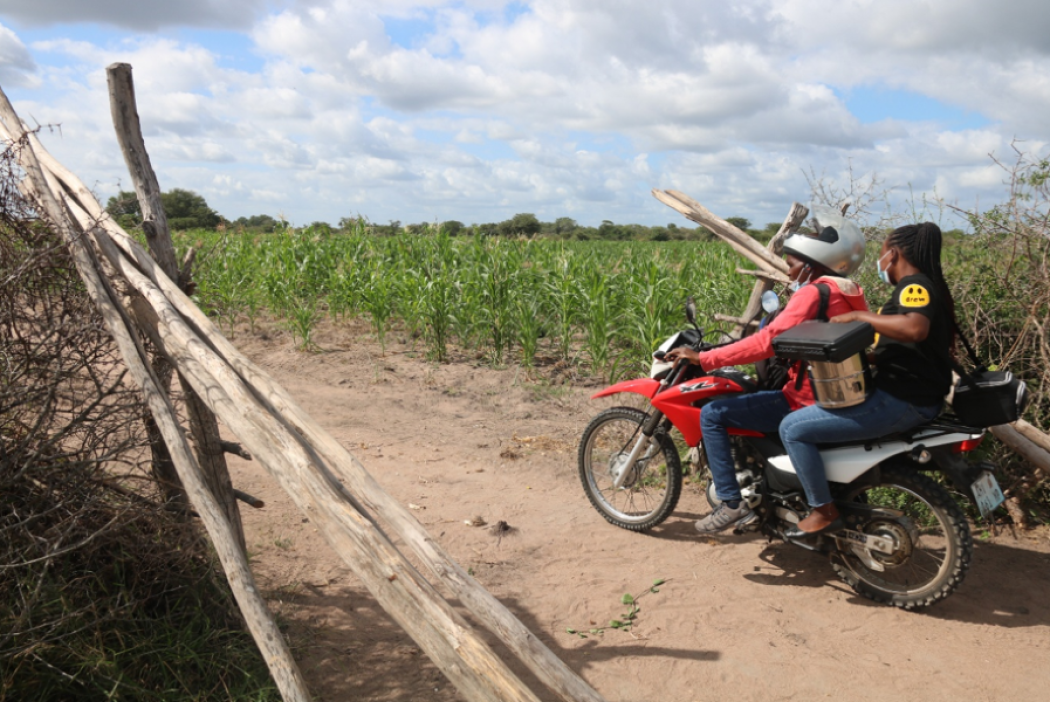Traveling Nurse Brings Lifesaving Care to Clients’ Homes

Each morning, Milagrosa Matsinhe, a maternal and child health nurse at the Chokwé Military Health Center in southern Mozambique, reviews her work plan, including the list of clients she will visit that day. To reach her clients—military personnel and families residing within a 30-kilometer radius of the health center—she rides a motorbike, driven by a colleague, through Chokwé’s farms and grasslands.
A top priority for Milagrosa is screening eligible women for cervical cancer, the most common cancer among Mozambican women ages 15 to 44, accounting for 40% of new cases and 39% of deaths from all types of cancer. Women living with HIV are particularly vulnerable to developing cervical cancer; with 14.5% of women ages 15 to 49 in Mozambique living with HIV, this translates to approximately 1.5 million women at increased risk.
Cervical cancer is also one of the most preventable and treatable cancers. HPV vaccination protects against most cervical cancers and regular screening can catch precancerous lesions, which can then be destroyed using thermal ablation, a heating process that destroys precancerous tissue, or loop electrosurgical excision procedure (LEEP), a procedure to treat more advanced lesions.
One of Milagrosa’s regular stops is the home of Lurdes Ubisse, who underwent LEEP at Chokwé Rural Hospital for an advanced precancerous lesion. “Lurdes’s [treatment] journey didn't end after [the LEEP procedure]. Since there is limited transportation to the health center, I regularly visit her home for follow-up examinations,” says Milagrosa.
During one of these visits, Milagrosa screened Lurdes for follow up. The screening was negative.
Milagrosa has earned not only her clients’ gratitude but also their trust. Says Lurdes, “She treated me so well that I entrusted her with my health and invited my cousin to be seen here at home.”
When Milagrosa examined Lurdes's cousin, 33-year-old Essineta Ubisse, using visual inspection with acetic acid as part of the screen-and-treat approach, she identified signs of precancer. Milagrosa took the next step and treated Essineta using a thermal ablation device, which she carries on the motorbike along with all the materials needed for screening, saving Essineta a trip to the health facility.
While maternal and child health nurses at all levels in Mozambique receive training in cervical and breast cancer screening, in 2022, Milagrosa attended a refresher training led by Jhpiego on cervical screening procedures and thermal ablation. In addition to learning the screen-and-treat approach, Milagrosa received instruction on maintaining the device used for thermal ablation and critical infection prevention practices for safely performing the procedures.
From September 2023 to August 2024, Milagrosa screened 202 women, 154 at the health center and 48 in the communities she serves. Of the 48 women screened in the communities, 10 tested positive for early precancerous lesions, and all received the required treatment.
With Jhpiego’s technical support, nurses like Milagrosa are helping to ensure women have access to critical health care services and are contributing to the World Health Organization’s aim of eliminating cervical cancer as a public health problem by 2030.
Nurse Milagrosa is passionate about her work. “I want to help women care for their health so they can see their children grow to adulthood. I do my work for love,” she says.
During World Health Worker Week, we celebrate the dedicated health workers around the world who work tirelessly to achieve a healthier future for all. Strengthen, invest in, protect, and value our health workers, the heart of global health!
Tracey Shissler, Project Director at Jhpiego, provided a technical review of this article.
Manuel Jesus Joaquim is the Senior Communications Advisor at Jhpiego Mozambique.

